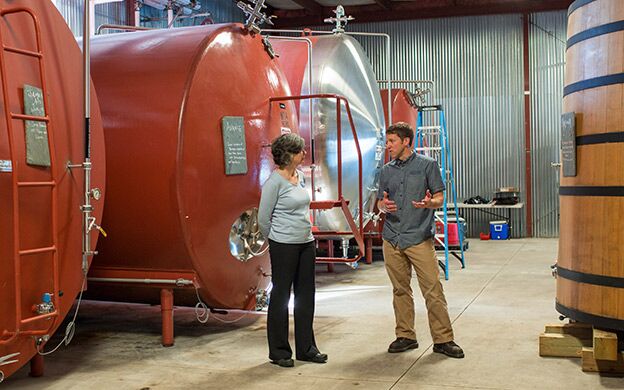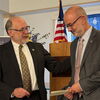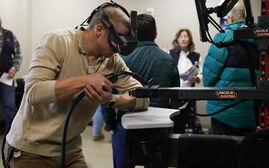Maine Food Strategy focuses on widespread food systems change
 PHOTO / MAT TROGNER, ALLAGASH BREWING CO.
Tanya Swain, director of Maine Food Strategy, talks to Allagash brewmaster Jason Perkins at an event Tuesday morning focused on changes to Maine's food system.
PHOTO / MAT TROGNER, ALLAGASH BREWING CO.
Tanya Swain, director of Maine Food Strategy, talks to Allagash brewmaster Jason Perkins at an event Tuesday morning focused on changes to Maine's food system.
As the world moves toward 9.5 billion or more mouths to feed by 2050, according to United Nations’ estimates, agriculturalists are looking for new ways to get more out of farming, including in Maine, where the Maine Food Strategy initiative started Tuesday to bring together interests across the state to broadly strengthen the food system now and in the future.
The initiative is advised by a volunteer steering committee and is financially backed by Boston-based Third Sector New England.
In a press conference at Allagash Brewing Co. in Portland Tuesday morning, the group said it has formed five goals and a Framework document with input from interested parties on ways to achieve annual market growth in a sustainable manner. The other goals include improving the ability of businesses across the food production supply chain to manage marketplace growth and change and increasing incomes and access to benefits for food supply workers. Additionally, the goals aim to promote public policies that support farms, fisheries and other food production supply chain businesses as well as ensure food insecure individuals have access to resources that address their needs.
“The purpose of the Maine Food Strategy and the Framework document is to mobilize Maine people working in these areas to support the growth we’ve seen while also keeping the system in balance,” MFS Project Director Tanya Swain said in a prepared statement. “To find new solutions that allow us to do this will require looking beyond specific problems and seeking to understand what these issues, together, say about how the system is operating.’
During the press conference, Allagash brewmaster Jason Perkins was slated to talk about how his company partners with local producers such as Doles Orchard in Limington, which provides cherries for its Coolship Cerise and Nancy labels.
And with 90% of the seafood consumed in the United States being imported, groups like LocalCatch.org are creating links to national distribution channels. Founder Joshua Stoll was scheduled to be at the event talking about how his company’s network of fishermen, researchers and community advocates provide local, healthful, low-impact seafood via community-supported fisheries and other direct marketing arrangements.
Veggies for All, a food bank farm working to relieve hunger by growing vegetables for those in need, also talked about collaborating with partners to distribute and increase access to quality nutritious food.
The next step is for MFS to assess its progress around at its annual gathering on Dec. 2 at the University of Maine’s Wells Conference Center in Orono.













Comments